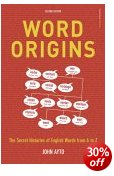The hidden histories of English words from A to Z
The average contemporary English speaker knows about 50,000 words. A large proportion of this total will actually be derived from Greek, Latin, French, and the Germanic languages. It is also estimated that every year, eight hundred neologisms are added to the English language. These include acronyms (nimby, from ‘not in my back yard’); blended words (motel, from motor + hotel); and those taken from foreign languages (savoir-faire). The entries in John Ayto’s Word Origins run from aardvark to zombie, laid out in an A-Z format with detailed cross references, and written in a style that is both authoritative and accessible.
 This is a valuable historical guide to the English language, aimed at students, general readers, and anybody who has an interest in words. For a full understanding, it helps to have at least a smattering of language history, which he provides in an amazingly compressed introduction. For instance, he gives as an amazing example the linguistic connection between the two apparently dissimilar terms bishop and spy. Indeed, his entries on individual words offer interesting potted histories
This is a valuable historical guide to the English language, aimed at students, general readers, and anybody who has an interest in words. For a full understanding, it helps to have at least a smattering of language history, which he provides in an amazingly compressed introduction. For instance, he gives as an amazing example the linguistic connection between the two apparently dissimilar terms bishop and spy. Indeed, his entries on individual words offer interesting potted histories
bishop [OE] Bishop originally had no ecclesiastical connections; its Greek source, episkopos, at first meant simply ‘overseer’ from epi- ‘around’ and skopein ‘look’ (antecedent of English scope, and related to spy). From the general sense, it came to be applied as the term for various government officials, and was waiting to be called into service for a ‘church officer’ as Christianity came into being and grew. The Greek word was borrowed into ecclesiastical Latin as episcopus (source of French éveque) and in more popular parlance lost its e-, giving *biscopus, which was acquired by English in the 9th century.
> SCOPE, SPY
Of course a great deal of our vocabulary is borrowed from or based on Greek and Latin, but a huge variety of other languages have contributed to our current lexicon of around a million and a quarter words.
This richly mixed heritage helps to explain not only why the lexicon is the world’s biggest, but also why so many words are difficult to spell, and why there are so many different terms for the same thing.
One of the benefits of a book like this is that its explanations are all sourced in a scholarly fashion, which lends credence to them. And at the same time they are offered in a very entertaining manner. I’ll certainly be more careful about using the term gobbledegook in future.
© Roy Johnson 2006
John Ayto, Word Origins, London: A and C Black, 2nd edn, 2005, pp.554, ISBN: 0713674989